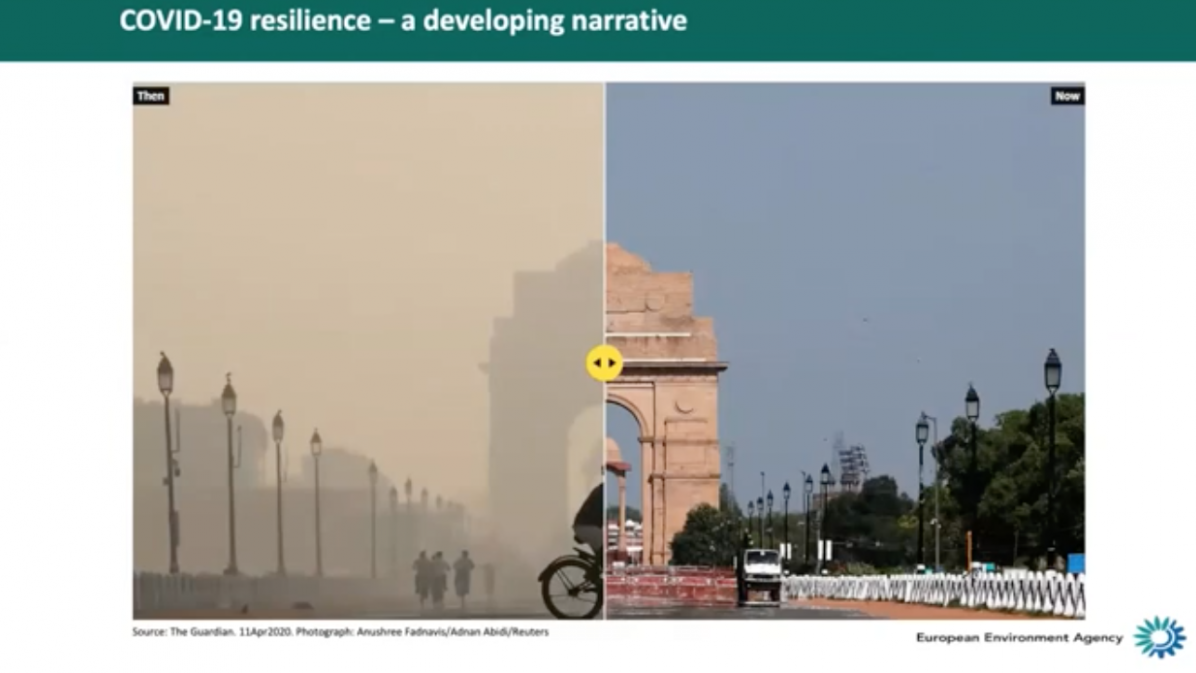How global shock of Covid-19 will impact tackling the Climate Emergency
The global shocks from COVID-19 are deep and terrifying. But the massive health tragedy offers new and unexpected hope for speeding up tackling the climate emergency and reducing the speed of increase of global temperatures.
Dramatic evidence of what is possible comes from a huge drop in pollution, CO2, nitrous oxide and greenhouse gas emissions.
“Values are getting much lower,” Josef Aschbacher from the European Space Agency told the first Climate Action webinar analysing how the Covid-19 crisis could energise efforts before COP26 in 2021 to slow then halt the rise in global temperatures.
ESA “takes the pulse of the planet”. It showed compelling new satellite data collected between mid March and mid April.
NoX levels are down 48% in Madrid, 47% in Milan, 49% in Rome and 54% in Paris. Emissions from unabated coal fired power stations in India and China look like giant red/orange spikes in what is otherwise an unusual desert of low emissions activity created by lockdowns.

Images of the Vatican, or India Gate in Delhi are clear and not distorted by pollution. “This shows how much influence humans have on the planet. Levels will go up again after the lockdown”, said Dr Aschbacher.
The possibilities are enormous. Yet as this webinar asked: will governments and corporates not just take notice, but see in the catastrophe created by Covid-19 the necessity to act much faster on the climate emergency and sustainable development goals?
Two thirds of webinar participants were skeptical. They would only vote for ‘possible’ or ‘partly’ when asked how far will governments and corporates be willing to link economic recovery plans to the Sustainable Development Goals and Green Deals to align with the Paris Agreement of 2016. Only 3% voted ‘definite’.
So how much have the horrors of dealing with Covid-19, including saving people and economies impacted the way governments now have to think?
Overall “Covid will give a much greater significance and urgency to the need for greater attention to resilience and adaptation in climate action discussions,” Dr David Nabarro, special C-19 envoy to the World Health Organisation told the 1450 webinar attendees. “We are seeing widespread changes in peoples’ behaviour all over the world.”
On the new reality, mountains of resistance and scepticism are moving. He sees “many signs people are coming to terms with it. We are learning much from our response to Covid-19 which can be applied elsewhere”.
A huge part of the ongoing uphill journey on confronting the sustainability and climate emergency challenges with radical policies has been political resistance and downright scepticism towards the science and scientists. Their conclusions are often criticised for undermining economic prosperity.
But in the nerve-wracking weeks of Covid-19, Dr Nabarro has seen a welcome shift: “Many governments are saying we need scientists to help us, not only to understand what is happening now but also to make projections into the future.” He described the new relationship as “refreshing and inspiring”.
Yet there is also clear data that “some of the countries that are facing the most difficult problems with getting on top of Covid are the same governments where heads of state have been questioning scientific advice in a very public way, although not in all countries”.
So what is needed is a “new positive dovetail relationship between science and government” with governments having “an open ear to science”. After all “I see businesses everywhere recognising that this does mean they rethink all practices: practices with their customers, their employees, their suppliers, their shareholders”.
The big appeal is for what Helena Molin Valdes, Director of the UN Clean Air and Climate Coalition called “the need for political leadership and political will” of the kind forced brutally on leaders by Covid-19. “We can use C-19 as a wake up call, but will it be turned into action? Technology and public opinion are on our side” as we “continue on an unsustainable path”.
All voices wanted seismic change. “Addressing C-19 must not be at the expense of other crises – especially climate and biodiversity” said Martin Adams from the European Environment Agency. He showed a photo of the usual giant traffic snarl in the Rue de la Loi from the European Commission in Brussels before the C-19 crisis. “Is this a measure of success if we return to where we were a few months ago?” he asked.
There is no alternative to thinking and working differently, warned Pushpam Kumar, Chief environmental Economist for the UN Environment Programme. The long run is not months or years but “the day after tomorrow”.
That is because the pressures are so urgent and acute. C-19 means that half a billion people will be poorer, with big numbers facing extreme poverty. Big change is needed. “The economy has to be build around wealth, not income; through inclusive or comprehensive wealth, not the GDP.”
Green has far greater employment potential than defaulting to the old structures and models. In the end it costs less, with better jobs and outputs, said Dr Kumar.
Have governments learned? Are they learning?
“It is not automatic at all” was the sober webinar mood. Since C-19 only 11 per cent of new investment so far has gone to green. That is because the priority is jobs, not confronting sustainability and climate emergency issues, warned Helena Molin Valdes.
But C-19 has created a huge new focus it is hard for leaders to avoid without an eventual backlash from the public. What have leaders learned?
“It is an eye-opening experiment which is taking place right now on the planet,” said Josef Aschbacher from ESA. “People, governments, politicians really learn that if you are not looking after your planet you will suffer: not only yourself but also the planet.”
Nik Gowing moderated the webinar at 1400 GMT on 30 April 2020. It is a joint project of Climate Action and the Thinking the Unthinkable project.
